Speaker Shekarchi (and others) on the future of housing in Rhode Island
"Housing is a human right," said State Senator Melissa Murray.
On Thursday, August 29 Rhode Island Governor Daniel McKee ceremonially signed a slate of bills into law,1 aimed at addressing the housing crisis. The following is an edited transcript of what some of the speakers at the ceremony said, with a focus on the important policymakers:
Speaker K. Joseph Shekarchi: People ask me, why do you feel so passionate about housing? Because all good outcomes come from housing. We can talk about education, we can talk about healthcare, but if people don't have a place to go home to at night, what is it all for? So all good outcomes come [from hopusing] and let me tell you something, we have done a lot of good things.
The [bills] are individually moving the needle, but we need to work together... I can't do it alone. I need government partners and I have them with my colleagues in the General Assembly [and] Governor McKee, my good friend who we work very closely with. We put together the largest single bond in the history of Rhode Island. The Governor was adamant that a good portion of that bond be used for home ownership because that was important to him and we saw the wisdom of that and we included that in a very significant amount...
Not every community has embraced the changes. But I have to say something and this is not a political statement. This is just a fact, and I want to call it out. Mayor Frank Picozzi and the City of Warwick - in particular the Warwick Planning Department - have embraced these changes and Warwick is leading the state in building permits - the entire state.
It does not happen. Not every municipality is as welcoming as that and I will tell you, not every municipality has adopted them. Some have adopted rules to try to thwart the changes we've done. That's a sad state of affairs and they will face the voters come November. The reality is that we have been far behind the rest of the country. We have been dead last per capita in housing stock for a long time in Rhode Island, but things are changing.
There are successes to report. Building permits are up. The backlog in the housing court that we established a year and a half ago is dramatically less. We have made it easier to do business here in Rhode Island. We have made it easier for the private sector to work so they can build and use private funds to build more housing, partnering with the nonprofit sector and Malina Lodge and of course Rhode Island Housing, Amy Rainone, of course, and Carol Ventura.
It doesn't happen unless we all work together. What you see in this room is a commitment from everybody who wants to make this a reality, who wants to make it happen - because it needs to happen. It needs to happen. We need to continue this fight. I'm expecting more legislation to come from our land use committee that's generating a lot of good ideas as well as our affordability committee that Representative Speakman handles.
Senator Meghan Kallman: As a sobering anecdote, the reason we're here today is because we still have a problem. Last week I got a call from a panicked constituent whose coworker was losing her home. She's a single mother to a 7-year-old son, and the landlord was selling the building. They don't have anywhere to go. The end of the month is going to be here in a few days and we still don't know where they're going. These are the human stakes of the issue that we're looking to solve.
That said, there's been a lot of progress. Today I want to specifically highlight the Accessory Dwelling Unit (ADU) legislation sponsored by Senator Gu and Representative Speakman. For a state that has historically ranked last in the country on housing production, ADU is our game-changer. I was at a conference this last week and I got to brag to Delaware that we got our bill over the finish line. They're still working on theirs and they're using ours as a model. ADUs are a critical piece of action to address the crisis in housing availability and affordability. ADUs help people stay where they are. They extend to all corners of our communities, providing critically needed housing for people who perhaps want to age in place or for young people who are perhaps coming back from college, starting their lives, and starting their careers. My mother somewhat recently kind of dropped into a conversation that she was also interested in living in an ADU with me. That was news to me, but I'm glad that we now have the structure to make that happen.
At the end of the day, every Rhode Islander deserves a safe and affordable place to call home. That's why we are all here. I'm so grateful that we moved ahead on ADUs as well as the range of other bills here to be signed today. I'm confident that as we continue to work on our housing initiatives, we can continue to link them to other priorities that this legislature is committed to solving, such as climate, health, and public transportation. There are ways in which all of these things talk to each other. So I'm looking forward very much to working with all of you to continue to move this down the fields.
Representative June Speakman: When we gathered last March at the State House for a press conference to announce the introduction of many of these bills, I, in my remarks, referred to our common task of addressing the housing needs of Rhode Islanders as a puzzle and I'd like to push that metaphor a little bit. This housing puzzle is hard to solve as we all know, but it's essential to solve and we all work together to find the pieces and to decide how to fit them together to make this work. Sometimes we disagree on what piece goes where or whose hands are the ones that get to fit that piece into the puzzle, but we continue to work on it together. Sometimes there are pieces of the puzzle that are missing. They're under the table, they're still in the box, they haven't even been constructed yet, and we all have to figure out what to do together. For example, how to help renters who are paying more than 50% of their income on housing. We haven't figured that piece out yet, and I hope we can diligently work on that this year.
As Senator Kallman mentioned, when folks have received word that their rent is going too high or they're being evicted, we need to work on helping those folks out. As the Speaker often says, production, production, production is the partial answer to this question but there are also other things we need to do and to work on this year. This set of bills that the governor is about to sign today helps us solve this puzzle. As you've already heard, some of them make the process of approving or rejecting development proposals easier and quicker. Even if the proposals don't work, it's important to move them through quickly so we can get onto the next proposal. The option of combining zoning and planning and the encouragement of e-permitting are all ways of smoothing out the process of getting production done.
Some of these bills, as Senator Kallman said, give property owners a bit more flexibility in how they use their property, like the ability to build an ADU or a manufactured home on your lot. Others provide better information about available land and buildings for housing developments. Through the commission's work, we've discovered that we don't know what vacant lands are open for construction or what buildings can be adaptively reused. Some of these bills allow for the gathering of that information. All of that, we hope, will make it easier to develop and build housing, but in a way that does not undermine the character of our communities.
And about those communities and our municipal governments - as you may know, I'm a former municipal elected and I know how important it is for municipalities to hold on to the control that they have over what happens in their communities and how as they say, and they're right, one size doesn't fit all. What makes sense for Warwick might not make sense for Warren where I live. But I can tell you that this year in particular, both chambers engaged with municipal planners and with the League of Cities and Towns to make sure that the local voice was heard.
As these bills moved through the process, [municipalities] don't always get what they want. But those of you who do legislation know that nobody always gets what they want in this process. We also know that Governor McKee hears the voices of mayors and town administrators loudly and clearly. Some of his best friends are mayors, and he has a different kind of pen that he could use on these bills if they didn't move his agenda forward.
Senator Melissa Murray: We've made progress on this issue in recent years, but the housing emergency we face remains very real and we have so much work ahead of us. This issue is not unique to Rhode Island, but in terms of new housing production, as the speaker says, we've fallen significantly behind our neighbors in New England and the rest of the country. Turning this situation around is essential. It's critical for children and families who need and deserve the stability that comes from a safe and affordable place to live, is critical for our economy so people can afford to live and work and stay in Rhode Island, it's critical for our communities so that young folks can realize the dream of home ownership, and Rhode Islanders can age at home with dignity and security.
Housing is a human right. I'm going to go off script for a moment here because I want to share with you my personal experience. About a year and a half ago, I was faced with finding housing. I am a renter. It took me well over six months to find a place in my district that I could afford and meet my needs. Fortunately, I was not faced with a deadline or a huge rent increase.
Imagine a state senator having all of those hurdles to overcome to find housing and how much more exponentially difficult it is for someone without my resources. The bottom line is that addressing the housing emergency and ending housing security is essential for Rhode Island's future. This crisis impacts people from all walks of life in every single corner of our state. Although the steps we are celebrating today will have a meaningful and positive impact, even as we celebrate, we must together recommit to changing Rhode Island's long-term trajectory in terms of housing affordability and availability.
Interim Housing Secretary Dan Connors: The renowned Department of Housing is the state's lead agency for housing, homelessness, and community development, thanks to the collective efforts of the key decision-makers here. So thank you for putting that forward as a priority for the state. I'm grateful to be here. Thank you, governor, for the temporary assignment. I'm grateful to continue to focus on the common good, much as I was able to do at the Health and Human Services Department.
Today is a significant milestone in the ongoing effort to mitigate the housing crisis... Many of these bills will accelerate production by streamlining and removing obstacles to the permitting process that represent a major barrier to producing affordable quality homes... For decades, Rhode Island has been struggling to produce enough housing units, and that scarcity has led to unaffordable homes, rising homelessness, and health risks. Quite honestly, the limited inventory and skyrocketing value of home ownership have put homeownership out of reach for vulnerable Rhode Islanders.
These [legislative] tools are essential. I was surprised that in the eighties, I think it was around '86, we had our peak production year. I was 10 years old at the time. In the eighties, we were producing more than three times the number of housing units than we did in 2022. We must reverse this trend, and the bills being signed today will help turn the tide.
The housing challenges, as I mentioned, developed over decades and progress will not happen overnight. There is significant work ahead, but it's important to remember that we are moving forward on a path of progress here. The innovative policies will set the stage for reversing that trend. I won't go through each of the bills that have been mentioned, but I'm specifically going to call out something that has not been mentioned, which I think is critically important to future success in housing.
The package puts a focus on improving the quality of information developed by a comprehensive statewide geographic information system to approve data management and integration. There's a long way to go. I was lucky to sit at the State Planning Council meeting a couple of weeks ago and was thinking back to some of the conversations that we were having in Cumberland 15 years ago.
Each bill contributes uniquely to the overarching goal of increasing the availability of affordable homes, tackling the issue for multiple agencies, and creating a more robust and effective solution, that will ensure Rhode Islanders have a safe, quality, and affordable place to call home. And I would be not doing my job if I didn't take a moment to put a fine point on the $120 million housing bond that the governor and the General Assembly proposed and will be on the ballot in November.
The Department of Housing and our partners in the community that are going to take this work forward have the resources necessary to build on the foundation that the legislation being signed today sets forth. The work is not done. It will take continued effort to produce the housing the state needs, but with the leadership of our state focused on this issue, which it very clearly is, I think we're on a good path to reversing the trend...
Today is the day for celebration because for far too long, for too many decades, housing didn't get the attention that it rightly deserved. But you're rising to the challenge and I'm grateful to be here to help execute the laws that you put on the books and to bring forward the mission that you bring alive through the budget.
The legislative package includes:
Allowing homeowners the right to develop a single accessory dwelling unit (ADU) on their property (7062A/2998A): Sponsored by Rep. June S. Speakman (D-Dist. 68, Warren, Bristol) and Sen. Victoria Gu (D-Dist. 38, Westerly, Charlestown, South Kingstown), this bill gives homeowners statewide the right to develop an ADU on an owner-occupied property to accommodate a disabled family member, or within the existing footprint of their structures or on any lot larger than 20,000 square feet, provided that the ADU’s design satisfies building code, size limits and infrastructure requirements.
Expanding ‘rights’ of manufactured homes (7980Aaa/2989A): Sponsored by Speaker Shekarchi (D-Dist. 23, Warwick) and Sen. David P. Tikoian (D-Dist. 22, Smithfield, North Providence, Lincoln), this bill allows, by right, manufactured homes constructed in accordance with HUD Regulations as an alternative option to stick-built homes where single- family housing is allowed.
Allowing municipalities to combine zoning and planning boards(7979/2991): Sponsored by Speaker Shekarchi (D-Dist. 23, Warwick) and Sen. John Burke (D-Dist. 9, West Warwick), this bill creates a pilot program giving municipalities the authority to combine zoning and planning boards as long as the agenda reflects what authority an application is being heard under. This would create an expedited process and allow municipalities that are unable to fill board seats to utilize one board for both functions.
Reforming the State Building Code Office (7983B/2990A): Sponsored by Rep. Cherie Cruz (D-Dist. 58, Pawtucket) and Sen. Frank A. Ciccone (D-Dist. 7, Providence, Johnston), this bill codifies the existing structure of the State Building Code Office and clarifies the role of the State Building Code Commissioner. It modifies statutory language to ensure a uniform interpretation and enforcement of the building code statewide. It also would establish a building code education and training unit with input from the Rhode Island League of Cities and Towns to educate building officials and inspectors statewide.
Allowing electronic permitting for development applications(7978A/3036A): Sponsored by Speaker Shekarchi (D-Dist. 23, Warwick) and Sen. Melissa A. Murray (D-Dist. 24, Woonsocket, North Smithfield), this bill allows municipalities to use electronic permitting for building permits. The legislation builds upon the platform established and created by the Rhode Island Department of Business Regulation, which is currently in use and required for building permits for applications and submissions for planning and zoning. The legislation would provide greater transparency and efficiency, streamlines processes and makes timelines and submission requirements clearer.
Creating a Special Legislative Commission to address shortage of municipal planners (7977A): Sponsored by Speaker Shekarchi (D-Dist. 23, Warwick), this bill establishes an 11-member Special Legislative Commission to study the ability of the Rhode Island educational system to offer degrees or certificates to provide a supply/pipeline of planners, planning technicians and staff, and report back to the General Assembly by January 1, 2025. Its purpose is to address a shortage of planning professionals in the state and the lack of a local educational program to establish a pipeline for these jobs.
Positioning abandoned properties for redevelopment (7986Aaa/2992A):Sponsored by Rep. José F. Batista (D-Dist. 12, Providence) and Sen. Meghan E. Kallman (D-Dist. 15, Pawtucket, Providence), this bill amends the existing statute for abandoned properties to require a municipal inventory, with yearly updating, and clarifies the process regarding the required abatement of abandoned properties. Additionally, in the case of nuisance properties that are in receivership, the bill enables judges to give priority to buyers who are willing to add deed restrictions that designate the property as low- or moderate-income housing or owner-occupied housing, or make other commitments to keep it affordable.
Amending procedures to get approvals from permitting authorities (7949Aaa/3001A): Sponsored by Rep. Robert E. Craven, Sr. (D-Dist. 32, North Kingstown) and Sen. Matthew L. LaMountain (D-Dist. 31, Warwick, Cranston), this bill makes amendments and clarifications to various provisions relative to subdivision of land review, review stages, special provisions related to development, and the procedures for approvals from various permitting authorities.
Amending zoning laws for affordable housing developments (7948A/2999A)Sponsored by Rep. Joseph J. Solomon, Jr. (D-Dist. 22, Warwick) and Sen. Jacob Bissaillon (D-Dist. 1, Providence), this bill provides amendments to the requirements of the inclusionary zoning law for affordable housing development to incorporate feedback from the Rhode Island Chapter of the American Planning Association. Inclusionary zoning is an optional tool for municipalities to require the provision of affordable units in conjunction with the development of market rate units.
Simplifying wetlands zoning regulations to spur housing development (7982/2994) Sponsored by Rep. Terri Cortvriend (D-Dist. 72, Middletown, Portsmouth) and Sen. Mark P. McKenney (D-Dist. 30, Warwick), this bill amends provisions relative to the application of zoning ordinances pertaining to wetland buffers to projects for development, redevelopment, construction or rehabilitation. It makes clear that there can be no local regulation of coastal wetlands and freshwater wetlands beyond the requirements of the state agency requirements.
Amending the permitting authority (7950A/3000A): Sponsored by Rep. Leonela Felix (D-Dist. 61, Pawtucket) and Sen. Dawn Euer (D-Dist. 13, Newport, Jamestown), this bill requires cities/towns to allow at least three disclosed types of financial security (such as surety bonds, letters of credit or cash) provided by developers on projects that include public improvements. Allowing varying types of financial options ensures that developers can choose the method that best suits their circumstances, which encourages development. Municipalities would not be able to limit the bond to one specific type, but still retain their ability to require bonds and improvement guarantees for public improvements.
Helping spur home construction (7951A/2988A): Sponsored by Rep. Craven and Sen. Frank S. Lombardi (D-Dist. 26, Cranston), this bill would clarify the circumstances under which a municipality can limit accepting and hearing development applications and limit building permits related to the development of housing and specifies the timeframes in which those limitations can be in place.
Including mobile homes as affordable housing (7984Aaa/2993aa): Sponsored by Rep. Carol Hagan McEntee (D-Dist. 33, Narragansett, South Kingstown) and Sen. Louis P. DiPalma (D-Dist. 12, Middletown, Little Compton, Newport, Tiverton), this bill allows municipalities to count mobile home units as affordable housing if they meet certain requirements, including that they are permanent housing. Mobile homes could be applied toward the goal of 10 percent of a municipality’s housing stock to be low- and moderate-income housing, with a half credit per qualifying mobile home.
Exploring a Statewide Geographic Information System (GIS)(7985A/2995A): Sponsored by Rep. Tina L. Spears (D-Dist. 36, Charlestown, South Kingstown, New Shoreham, Westerly and Sen. Tiara Mack (D-Dist. 6, Providence), this bill instructs the Department of Administration to develop, with input from the League of Cities and Towns, a report on the creation of a comprehensive and integrated statewide GIS. This report would evaluate the cost, staff, organizational changes and data security requirements needed to establish and maintain the platform, in addition to the types of data that would be needed from agencies and local governments to maintain the system.

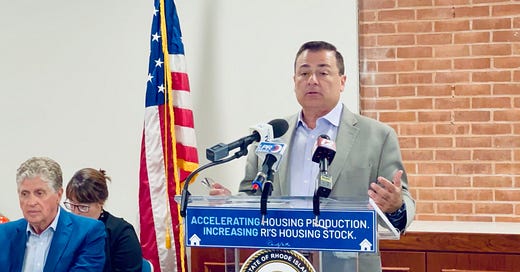



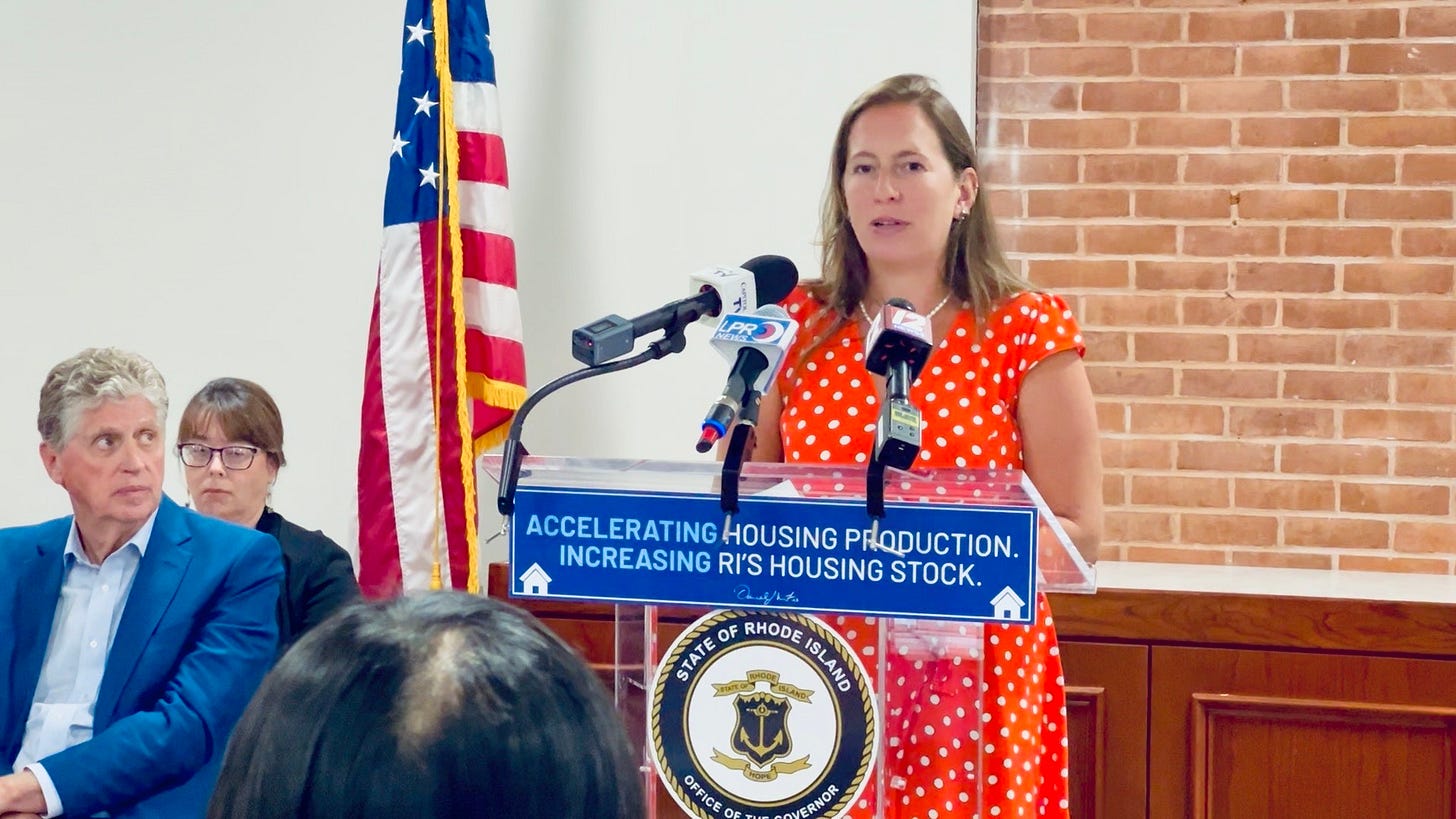
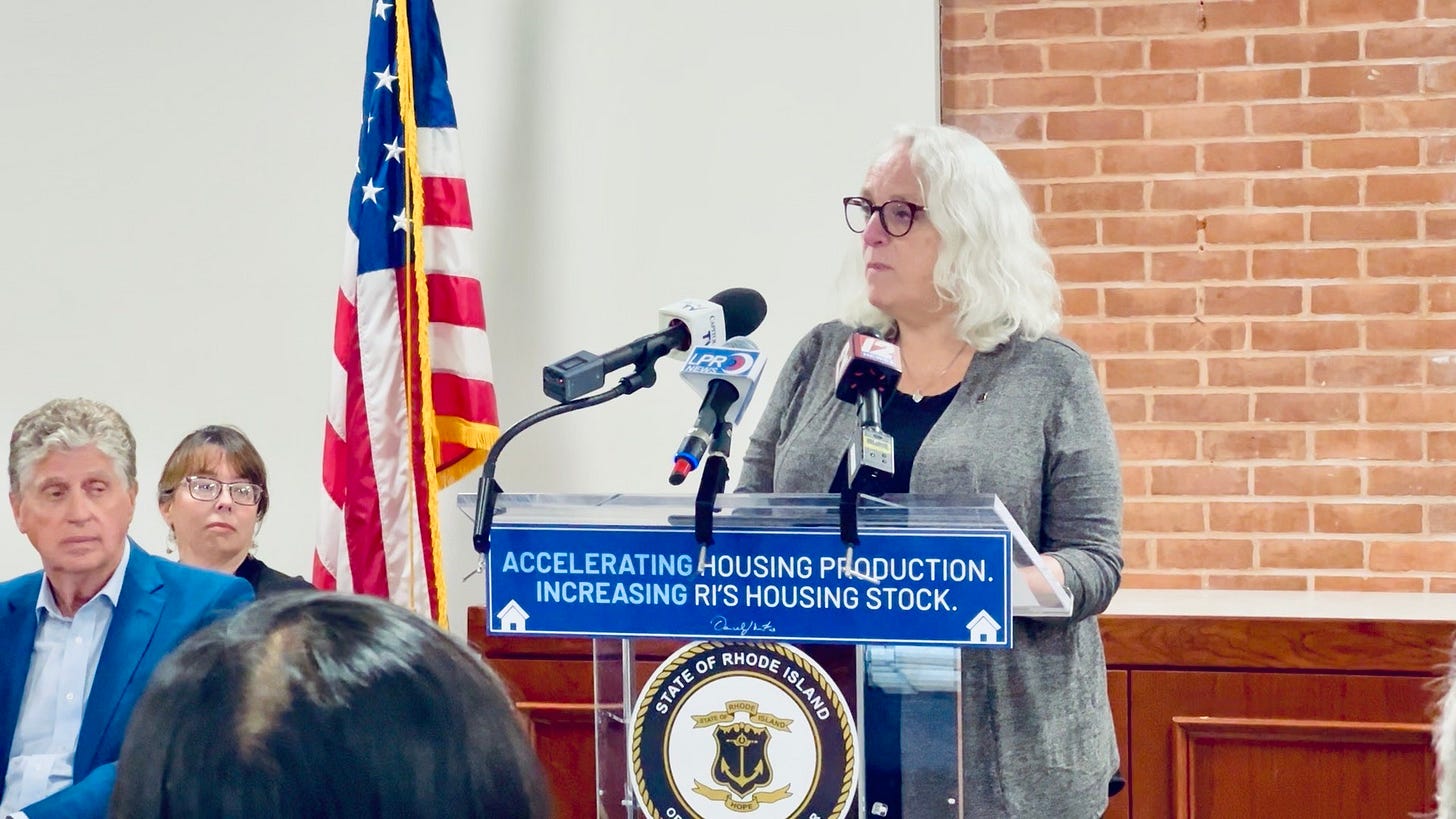
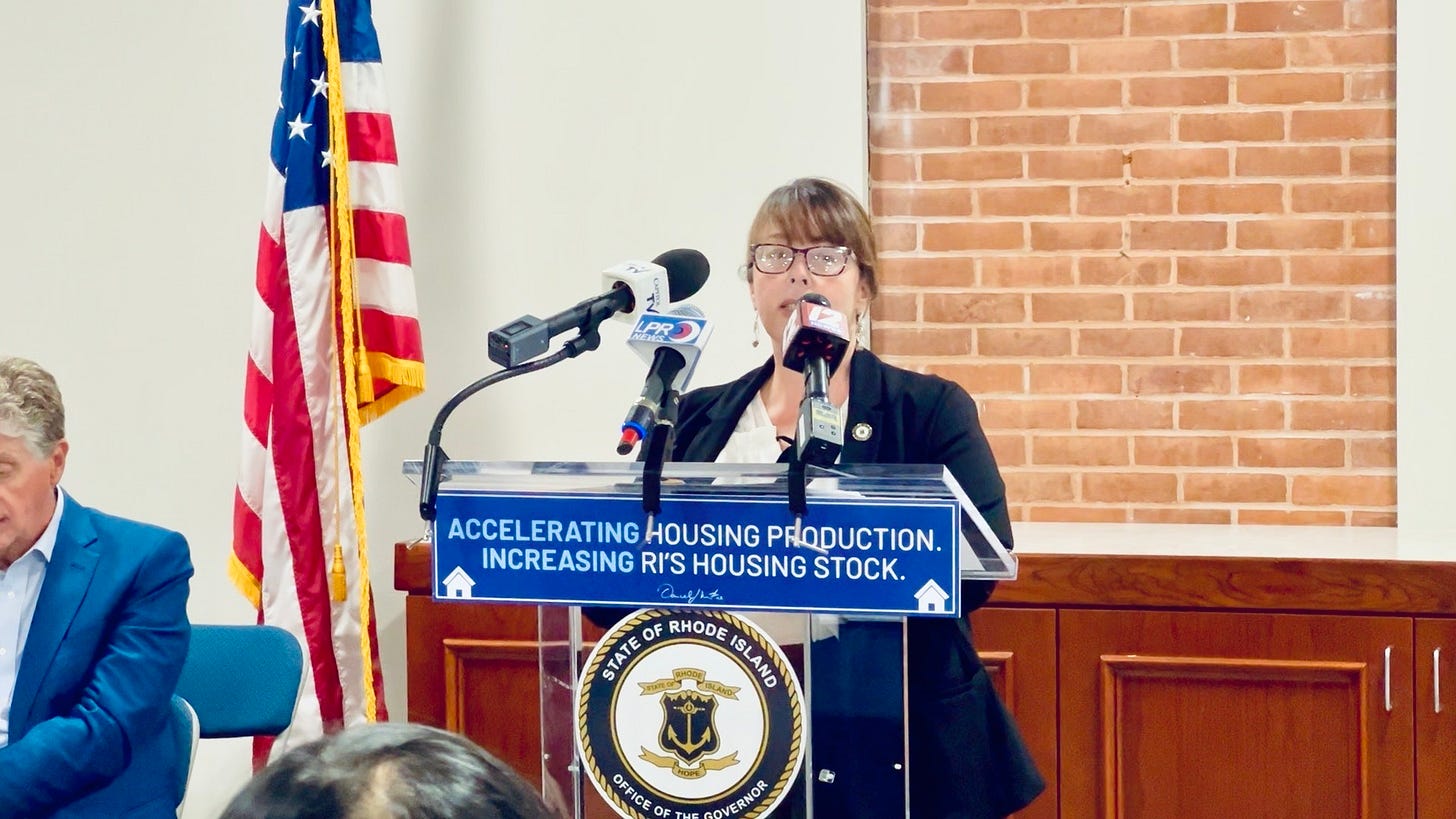
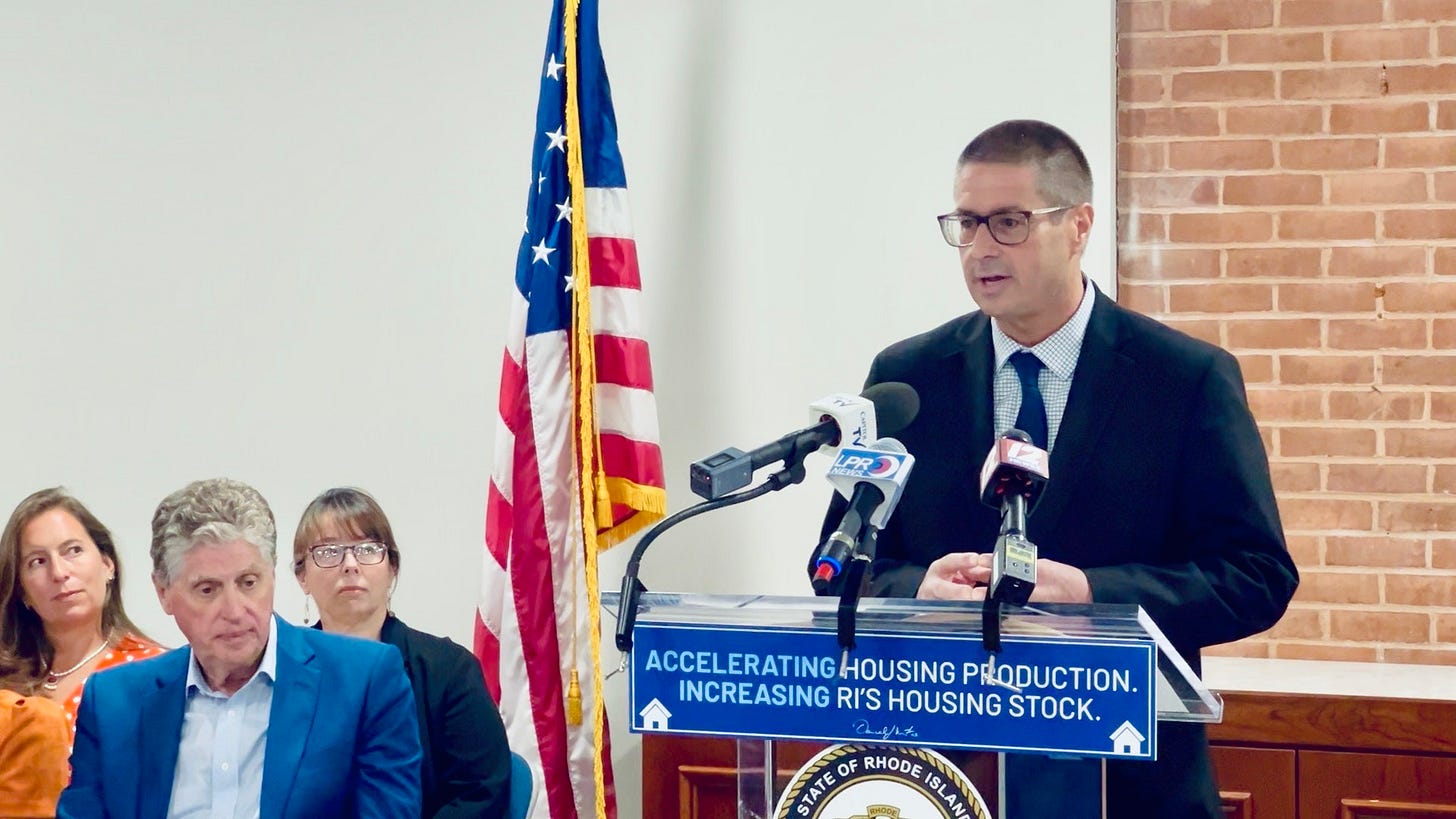

What I would like to see is coverage on the Landlord/Tenant meeting to take place on Thursday, 9/5. I'm now a Tenant and have some questions not covered in the current handbook.
I've owned my home for close to 30 yrs. It was time to leave for warmer climes. I moved back, knowing that I would be looking for an apt.
Living in Cranston, there isn't much room on the eastern end to build a thing. The houses are close together and built when families had one car. With luck, you could squeeze in 2. Kids grow, families expand, and now there's no room for a 3rd car. We can't park on the street but we take our chances. People are putting cars on their lawns, if possible.
There is no "affordable" housing in RI. What we see and hear are "market rates". Who sets the market rates? The landlords/owners do. They define it by how much of a profit they can leach. Of course, they won't admit that! Using HUD guidelines, many of us older folks wouldn't qualify for this housing. We are just over the limits, especially if we live alone. The singles still have the same expenses - rent, utilities, food, medical, car insurance (which is outrageous in RI), along with all the other taxes/fee R.I. imposes on everything they can get away with.
Not everyone wants a ''house'' - it comes with so many responsibilities. Not everyone is a DIY. What they do want is a place that they can make into a home.
Developers and investors (some of them just a group that puts their money together) buy a tenement, Paint it gray, wash the floors, toss the trash and then they want $2000 for a 2 br. Leave it the way you found it and they will still withhold the security. They will find any excuse to keep it. Fortunately, the State has stepped up and told landlords to stop with the application fees - that was a true money-maker for some. The good ones gave the money back to applicants but there are always those greedy folks - it's free money.
There are some good ideas but how quickly the State will move is another. We need a committee and then a subcommittee to examine the committee, then a lawyer to exam and reject it, HUD gets involved, then it's another committee and this train never stops at a station.
If we can take the politicians out of the equation or, at least get them to take off their political hats, maybe things will happen. I'm not counting on it. Nothing happens quickly in R.I. Throwing money at it isn't solving the problem. It's a people problem called greed. The ARPA money is a good example as is the PPP loans. Everybody wants a piece of the pie but they don't want to account for it.
We'll be watching to see if this is another stop, stall and sputter out.